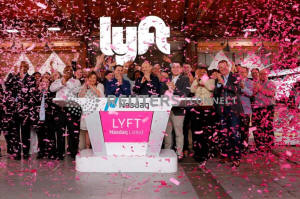Lyft shares soar on Nasdaq debut, setting stage for Uber
 Send a link to a friend
Send a link to a friend
 [March 30, 2019]
By Heather Somerville and Joshua Franklin [March 30, 2019]
By Heather Somerville and Joshua Franklin
LOS ANGELES/NEW YORK (Reuters) - Lyft Inc's
shares rose as much as 23 percent in their market debut on Friday, amid
strong investor demand for the ride-hailing service that bodes well for
larger rival Uber Technologies Inc.
Lyft's IPO, which is the year's biggest thus far, sets the stage for
other Silicon Valley unicorns seeking to debut in the stock market this
year, including Pinterest Inc, Postmates Inc and Slack Technologies Inc.
The success of the IPO came despite Lyft's steep loses, criticism of its
dual-class share structure, and some concerns over its strategy for
autonomous driving and new laws aimed at increasing driver pay.
Public market investors, keen on Lyft's revenue growth and after
enduring a long stretch with few IPOs from highly valued tech companies,
piled into the offering.
"There's money that wants to be invested into tech. This is a new area
and people are definitely interested in exploring it," said Catherine
McCarthy, an Allianz research analyst.

On Thursday, Lyft priced 32.5 million shares, slightly more than it was
offering originally, at $72, the top of its already elevated $70-$72 per
share target range, raising $2.34 billion in its initial public
offering.
The stock opened at $87.24 but later pared gains to close up 8.7 percent
at $78.29, giving Lyft a market capitalization of around $22.2 billion.
Lyft's offering ended up 20 times oversubscribed, similar to other
high-profile IPOs, with more than 500 orders from institutional
investors such as mutual funds, according to people familiar with the
matter.
Despite the optimism, there are also mounting concerns that these tech
IPOs may be coming at the peak of the market, when the benchmark S&P 500
Index has risen more than 200 percent since 2008.
LOSS-MAKING 'UNICORNS'
Lyft's 2018 loss widened to $911 million from $688 million in 2017,
despite revenue doubling in 2018 to $2.16 billion. The company has not
laid out a timeline for when it will turn a profit.
As a result, the IPOs of Lyft and other loss-making unicorns present a
predicament for investors sitting on the fence - they do not want to
miss out on popular companies with fast growth, but must weigh the risks
of businesses with unproven economics.
"Every portfolio manager is going to have to make a decision in the next
12 to 18 months about these new IPOs. It's a growing part of the
market," said JMP Securities President Mark Lehmann.

Uber, which is also loss-making, would be valued at about $128 billion
at its IPO if awarded the same multiple as Lyft. Uber is planning to
launch its IPO in April, sources have said.
Some of the companies' losses come from subsidizing rides, a tactic to
attract riders with discounts.
"With Uber and Lyft becoming public companies, shareholders will expect
them to rationalize prices on rides toward sustainable levels," said
Paul Hudson, founding partner at Glade Brook Capital Partners.
Lyft, as of December, had 39 percent market share in the United States,
up from 35 percent early last year.
Its success in battling better-funded Uber for market share surprised
even its own investors.
[to top of second column] |

Lyft President John Zimmer and CEO Logan Green applaud as Lyft lists
on the Nasdaq at an IPO event in Los Angeles, California, U.S.,
March 29, 2019. REUTERS/Mike Blake

"Nobody knew they (Lyft) would catch up to this level," said Navin Chaddha, a
venture capitalist with Silicon Valley firm Mayfield, which invested in Lyft in
2011.
From its earliest days, Uber aggressively outraised Lyft by billions of dollars,
employing tactics such as prohibiting prospective investors who reviewed Uber's
financial data from investing in the smaller competitor.
Just five years ago, some investors were convinced that Lyft would fail, and
board members discussed finding a replacement for CEO Logan Green.
Lyft Chairman Sean Aggarwal said on Friday the company will continue to
prioritize North American growth over international expansion after completing
its IPO. Uber is in more than 70 countries, although it has consolidated certain
overseas markets, while Lyft has stuck to the United States and Canada.
"Sticking with that playbook of owning this market (North America) and expanding
in this market is how we get to deliver to our public shareholders and the
long-term expectations that we set," Aggarwal said on the sidelines of Lyft's
IPO celebration Friday.
Lyft has explored expanding its service to Australia and Mexico, sources
previously told Reuters.
Aggarwal also said the company's co-founders, CEO Green and President John
Zimmer, worked in recent weeks to make investors comfortable with Lyft's
dual-class share structure, which has faced criticism from some investors and
corporate governance advocates.
Although it is common among highly valued tech companies, public market
investors still balk at this structure, which gives founders more votes per
share and outsized control of the company, long after it is startup-sized.
Lyft's structure will give the founders and certain other shareholders 20 votes
per share.

CELEBRATION AT AN AUTO DEALERSHIP
Instead of celebrating the first day of trading at the Nasdaq in New York, Lyft
opted to mark the occasion at a defunct auto dealership in downtown Los Angeles.
Lyft's staff, with family and friends, and Los Angeles Mayor Eric Garcetti
gathered before dawn for the kickoff. The building, unmarked on the outside,
gave away nothing about the celebration tucked away in the bowels of the old
facility, which had been outfitted with pink confetti and Lyft-branded scooters.
Lyft recently bought the facility to turn it into a driver services center, the
first of several it plans to open across the United States in the coming months,
where drivers can obtain services like help with taxes or charging electric
vehicles.
Garcetti said in his remarks that the old warehouse symbolizes "a transformation
of our economy."
He pointed out that CEO Green is a native of Los Angeles, adding that "some good
did come out of Los Angeles traffic."
(Reporting by Heather Somerville in Los Angeles and Joshua Franklin in New York;
Additional reporting by Chuck Mikolajczak and Carl O'Donnell in New York;
Editing by Nick Zieminski and Matthew Lewis)
[© 2019 Thomson Reuters. All rights
reserved.] Copyright 2019 Reuters. All rights reserved. This material may not be published,
broadcast, rewritten or redistributed.
Thompson Reuters is solely responsible for this content.
 |